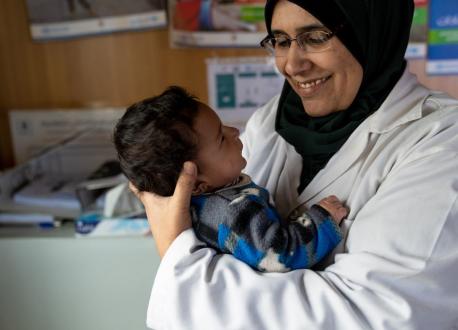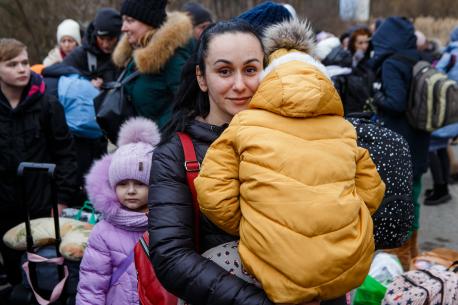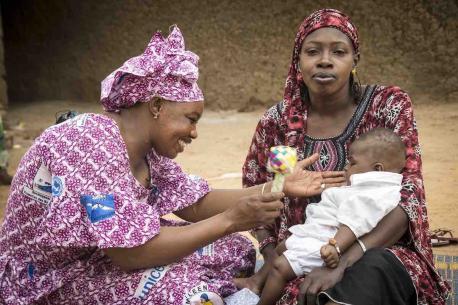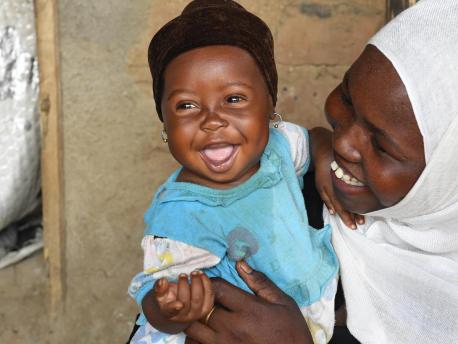
In Photos: Mothers Helping Mothers Around the World
Mother love knows no bounds — just ask any of the dedicated moms who work with UNICEF to improve the lives of vulnerable children around the world. They've taken the sense of responsibility they feel for their own children's well-being and scaled it up, to help other mothers give their children the best possible start in life, even under unimaginably challenging circumstances.
Below, from Malawi and Bangladesh to Jordan and the U.S./Mexico border, some UNICEF mothers explain why they give their all on behalf of the world's children.

Judith Sherman, UNICEF Malawi HIV and Maternal/Newborn Health Program Manager, cares for mothers and children in Malawi, and has two children of her own. "As parents, we all want the same things for our children: to be born healthy, to have a happy and safe childhood, to be well-educated and eventually to become independent adults, making choices about their own lives," she says. "As a UNICEF staff member, it's my responsibility to help both mothers and children realize these rights.
"I recently visited [GAVI- and UNICEF-supported] remote health facilities along Lake Malawi, facilities that are only accessible by boat or foot, mostly over mountainous terrain. When I arrived, I saw women and children who had traveled hours waiting to receive services, especially immunization. Afterwards, they would travel hours home. The women were determined to keep their children healthy, regardless of the distance. I could only imagine how devastating it would have been for them to arrive at a health facility, after walking for hours, only to find no vaccines were there."

Johora (far left, above), a Rohingya refugee who lives in Kutapalong Refugee Camp in Cox's Bazar, Bangladesh, works as a UNICEF Model Mother, a group of women selected and trained by UNICEF to share health and safety information with other families in their community. Johora, who has three children of her own, has visited at least 1,000 homes since she became a Model Mother, including the one pictured above, where three families live together under one roof. "We work every day except Friday," she says. "On Friday, we are at home with our family.
"Today I'm telling them about the mobile vaccinations. I also tell them how important it is to keep clean and for the children to wash their hands before and after eating and going to the toilet. We talk a lot about the rains [during monsoon season]. Everyone is afraid of what is coming. They are afraid of cyclones destroying homes, of diseases, and landslides."

"When a mother comes to me with her child, I feel like they are my own," says Zain Al Khaldi (above, right), a UNICEF community health worker who cares for Syrian refugee families at Za'atari Refugee Camp in Jordan. "It makes me work with tenderness and compassion. Every vaccinator who is also a mother understands this."
The mother of five and soon-to-be grandmother pays special attention to the mothers of children with disabilities, and those who have suffered serious burns. "I make sure they are comfortable and receive priority in the clinic. I always take their phone number to follow up on the child. I make sure they know that it's critical to vaccinate all children, especially the most vulnerable. Vaccination is important all over the world, but especially for refugees. What if they go back one day to their homeland? We have to make sure that they're protected. It's one of the most vital services in the camp."
"Being a mother is the title that I am most proud of," says UNICEF USA President and CEO Caryl M. Stern, mother of three and grandmother of two, pictured above during a visit to a shelter for Central American migrants at the U.S.-Mexico border in July 2018. "People often think that my role at UNICEF is the title I'm most proud of, but they're wrong. [Being a mother] is the most important job I have.
"Every mom has the same hopes for her children — for them to be safe, to be vaccinated, to play and laugh, eat hot food, go to school, sleep through the night and dream big dreams. It's universal! And at UNICEF, that's what motivates me to continue this work, because I get to see a mom hold her child and feel relief knowing that he'll be okay."
Top photo: UNICEF community health worker Zain Al Khaldi cares for Syrian refugee children living in Za'atari Refugee Camp in Jordan. Photo credits from top: © UNICEF/Herwig, © UNICEF, © UNICEF/UN0164448/Nybo, © UNICEF/Herwig, © Tanya Bindra for UNICEF USA
HOW TO HELP
There are many ways to make a difference
War, famine, poverty, natural disasters — threats to the world's children keep coming. But UNICEF won't stop working to keep children healthy and safe.
UNICEF works in over 190 countries and territories — more places than any other children's organization. UNICEF has the world's largest humanitarian warehouse and, when disaster strikes, can get supplies almost anywhere within 72 hours. Constantly innovating, always advocating for a better world for children, UNICEF works to ensure that every child can grow up healthy, educated, protected and respected.
Would you like to help give all children the opportunity to reach their full potential? There are many ways to get involved.





